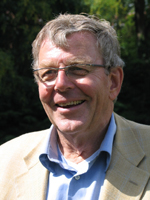Stokman and Padmos produced accurate prediction of Rutte IV coalition-agreement content

On Thursday 25 April 2021, prof Frans Stokman and Lars Padmos shared their predictions for four possible coalition agreements in the Government formation at the Democracy & Governance lunch webinar of Sustainable Society (RUG). Their predictions proved to be accurate. Yet, the coalition was not what had seemed likely on the basis of the election manifestos.
This was the sixth time that Stokman et al predicted the outcomes of the coalition negotiations with the REX Decide model. On the basis of the election manifestos and the analyses of the CPB and PBL, the policy stance and priorities of six potential coalition parties were determined for 12 main topics. The relative influence of the parties in the negotiations was based on the distribution of seats in the new House of Representatives. Then an exchange model, the REX Decide Model, was used to exchange stances, giving parties better outcomes on issues important to them in exchange for concessions to other parties on issues they find less important.
Coalition agreement
After a formation period of almost one year, the four parties VVD, CDA, D66 and CU concluded a coalition agreement on 15 December 2021 and Rutte IV continued the centre-right coalition from before the elections. However, Stokman and Padmos did predict that a coalition between VVD and CU would fail, as these parties are at the opposite end of the spectrum on the issue of refugees. So, a broad coalition with PvdA and GroenLinks had seemed more likely. Such a coalition would have given PvdA and GroenLinks the opportunity to achieve their election manifestos in the best possible way.

However, VVD and CDA refused to negotiate with both parties at the same time and in doing so they blocked this broad coalition - against the wishes of D66. However, PvdA and GroenLinks stuck together, perhaps inspired by the favourable results predicted by Stokman and Padmos.
After prolonged hesitation and major reservations on the part of D66 and CU, a coalition of VVD, CDA, D66 and CU was formed in the end, even though that had seemed the less likely outcome at the start. So a coalition without PvdA and/or GroenLinks after all. Once the Centre-Right Coalition had been formed, it became possible to establish the accuracy of Stokman and Padmos’ predictions for this agreement.
Despite the lengthy formation period, the predictions only deviated 16.19 points on a scale of 0 to 100 from the outcomes of the coalition agreement. There were two points where the prediction deviated substantially from the outcome:
• education
• defence expenditure
If we leave these two out of the equation, the average difference was only 7.64 points on a scale of 0 to 100.
About Frans Stokman and Lars Padmos
The specialisation of Frans Stokman (1941) is political decision-making. Stokman studied political sciences and obtained his doctorate at the UvA; from 1977-2006 he was Professor and subsequently Honorary Professor of Sociology at the RUG. The DECIDE method he developed with Reinier van Oosten has been applied by him and various employees to decision-making in business and in politics at local, national and international level.
| Last modified: | 02 June 2023 2.30 p.m. |
More news
-
29 April 2024
Tactile sensors
Every two weeks, UG Makers puts the spotlight on a researcher who has created something tangible, ranging from homemade measuring equipment for academic research to small or larger products that can change our daily lives. That is how UG...
-
16 April 2024
UG signs Barcelona Declaration on Open Research Information
In a significant stride toward advancing responsible research assessment and open science, the University of Groningen has officially signed the Barcelona Declaration on Open Research Information.
-
02 April 2024
Flying on wood dust
Every two weeks, UG Makers puts the spotlight on a researcher who has created something tangible, ranging from homemade measuring equipment for academic research to small or larger products that can change our daily lives. That is how UG...
